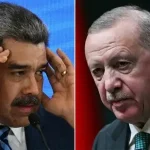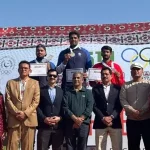The nation marks Youm -e- Takbeer on 28th May to commemorate the first nuclear test conducted on the hills of Chaghi, Baluchistan on 28th May,1998 (1st Safar according to Islamic calendar) at 15:16. The Pakistani scientists triggered the nukes which transformed the black graphite mountain into a milky white mountain and showed the world an unbeatable power of nuclear technology.
On this day Pakistan became the first nuclear Islamic country. Pakistan gave a strong response to India on its five nuclear explosions. This day conveys the message of immense power of defense for Pakistan especially for the revival of whole Muslim Ummah. Pakistan showed its strength to all those countries who were trying to lower Pakistan and considered it as a failed state, unable to defend itself from the enemies.
Historic Flashback:
Pakistan’s nuclear program was launched shortly after 1971 war. During the ruling period of General Ayub Khan, the nuclear reactor has been established by the help of ProfessorAbdus Salam. In 1972, Prime MinisterZulfiqar Ali Bhutto initiated the nuclear weapon development program and called all the Physicists and Engineers in Multan in 1972 and handed over the responsibility of this project to Munir Ahmed Khan.
The then PM Zulfiqar Ali Bhutto and the Chairman of PAEC Munir Ahmed Khan inaugurated the first nuclear reactor of Pakistan. India’s malicious designs did not stop after 1971 war, when India acknowledged that BNFL & CEA contracted with PEAC to provide Plutonium and contracted for the reprocessing plants in Pakistan, the BNFL has cancelled all the projects in 1974 due to the strong influence of India. On the other hand India has successfully tested his first Nuclear weapon at the distance of 93 Miles away from Pakistani territory in Rajasthan to show off his power. Zulfiqar Ali Bhutto strongly reacted on this event. Nonetheless, Pakistan has dexterously worked on the production of nuclear weapon development in order to protect itself from the most cunning neighbor who was trying it’s hard to humiliate Pakistan.
The major advancement to Pakistan’s nuclear program was after the arrival of Dr. Abdul Qadeer Khan, a Physicist and Metallurgical engineer in 1975. He brought the advanced and yet reasonable plans with him for the Uranium Enrichment Centrifuges and the list of necessary sources for the program.
Initially Pakistan was focusing on Plutonium for building nuclear weapons and for this purpose Pakistan signed a contract with France in October 1974 to provide facilities for Plutonium plant. However, after the arrival of Dr. Abdul Qadeer Khan and his new proposal, Pakistan has changed its strategy and moved towards the Uranium Enrichment Centrifuges. In 1976 PAEC made another agreement with France to build an atomic facility at Chashma. Unfortunately, again due to the US influence the France cancelled its all projects in 1978. Moreover, in 1977 CEA also cancelled all his ongoing projects due to fronting extreme pressure from US Secretary and other Western authorities.
On Dr. Qadeer’s suggestion, Pakistan focused its development efforts on highly enriched uranium (HEU), an extensive clandestine procurement network to support these efforts. A.Q. Khan persuaded Pakistan to work with Uranium (as compared to Plutonium) because Plutonium involves more hazardous procedures and cumbersome and expensive processes. Pakistan’s activities were initially centered in a few facilities. A.Q. Khan founded the Engineering Research Laboratories at Kahuta in 1976, which later to become the Dr. A. Q. Khan Research Laboratories (KRL).
The nation was rejoiced when Dr. Samar MubarikMand, member Pakistan Atomic Energy Commission (PAEC), announced that the team of Atomic Energy Commission developed the design of atomic bomb in 1978 and had successfully conducted a cold test after developing the first atomic bomb on 13th March, 1983.After the successful results of the cold Test Pakistan become nuclear power on March 1983. At last on 10th December, 1984 Dr. A.Q. Khan informed General Zia ulHaq through a written draft that with the grace of Almighty Allah we are able to execute nuclear blast on a week notice. Nonetheless after gain of such invincible power, Pakistan didn’t show off because Pakistan is a peace loving country and wants serenity across the region.
On 11th May, 1998 India again conducted three nuclear tests at Pokhran and just after two days India again tested two more of his nukes under the leadership of former Prime Minister of India AttalBihariWajpai. After testing their nukes, Indian leadershipbecame hostile towards Pakistan being a weaker state. India threatened Pakistan openly, sabotaging ceasefire agreement on Line of Control and atrocities on Kashmiris increased. Moreover, India pressurized Pakistan internationally.
By the grace of Almighty Allah, after 15 days of India’s nuclear test, Pakistan gave a resilient response in the form of testing the nuclear weapons on 28th May,1998 15:16 while reciting “Allah -o- Akbar (Allah is Great)” at the hills of Chaghi, Balochistan. Scientists selected the Koh-e-Kamran for the Test. According to Pakistani Standard time the Scientist has pushed the Fire Trigger on 3:17 PM. Within few minutes of Explosion the whole rock of Koh-e-Kamran turn into yellowish white ice dust. After observing the invincible power of Pakistan, India’s dubiousness was on top which was clear by the statement of Indian PM that India is ready to negotiate with Pakistan.
For this day, a survey was conducted across the country to suggest a name regarding this day. Several names were suggested and later on, “Youm -e- Takbeer” was chosen as the nukes were triggered while chanting the Takbeer. The nation commemorates this day by conducting several functions.
Pakistan nuclear program doesn’t aim at any nation; rather it is Pakistan’s policy of minimum deterrence to maintain the balance of power in the region. Pakistani nukes strengthen its defense against the nefarious designs of its enemies and is a warning to all those with malicious intentions.
May Allah give strength to our defenders. Amen
Pakistan Zindabad






